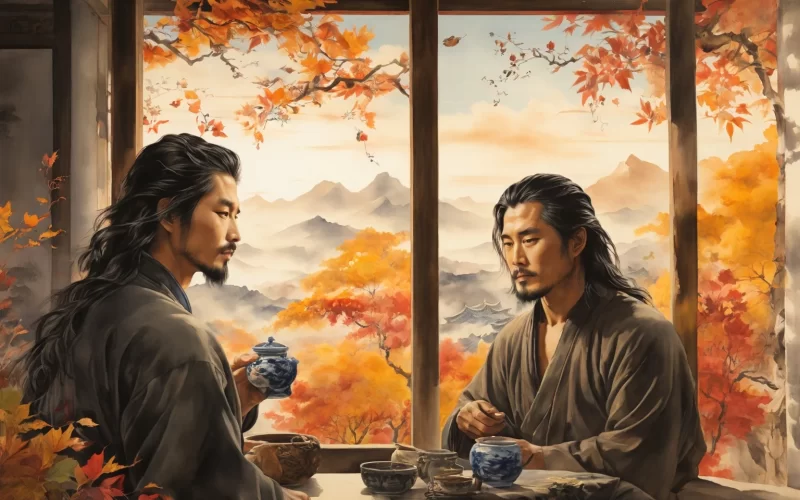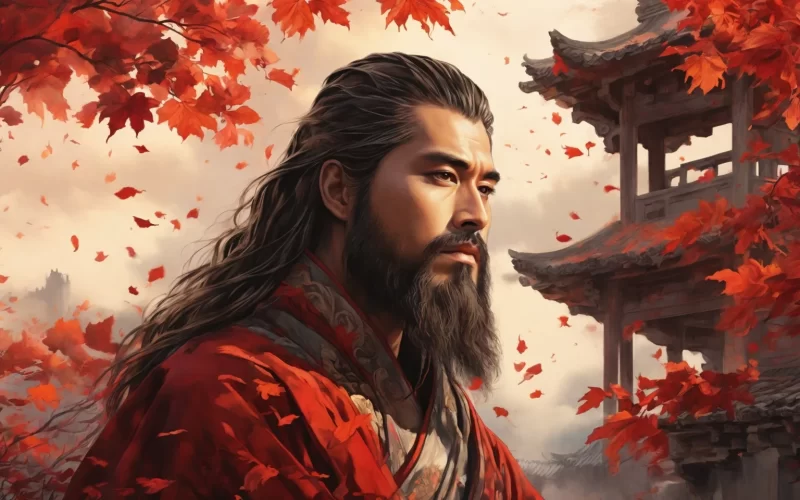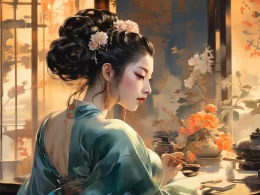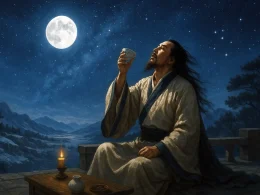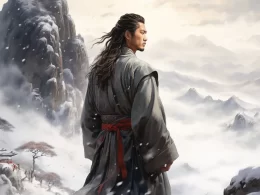We met last among flowers, among flowers we parted,
And here, a year later, there are flowers again;
But, with ways of the world too strange to foretell,
Spring only brings me grief and fatigue.
I am sick, and I think of my home in the country-
Ashamed to take pay while so many are idle.
...In my western tower, because of your promise,
I have watched the full moons come and go.
Original Poem
「寄李儋元锡」
韦应物
去年花里逢君别,今日花开又一年。
世事茫茫难自料,春愁黯黯独成眠。
身多疾病思田里,邑有流亡愧俸钱。
闻道欲来相问讯,西楼望月几回圆。
Interpretation
Composed during the Dali era of Emperor Daizong's reign while Wei Yingwu served as governor of Chuzhou, this poem emerges from a period of Tang decline marked by border conflicts and public hardship. Hearing of old friend Li Dan's impending visit, the poet pens this meditation where spring blossoms intertwine with profound longing and powerlessness toward turbulent times—a masterful fusion of scene and sentiment that mourns without despair.
First Couplet: "去年花里逢君别,今日花开又一年。"
Qùnián huā lǐ féng jūn bié, jīnrì huā kāi yòu yī nián.
Last spring we parted mid blooming boughs; Now flowers reappear—a year's full cycle now.
The floral recurrence underscores both cyclical nature and linear loss, embedding wistfulness within seasonal return. "A year's full cycle" (又一年) whispers time's quiet theft beneath vibrant petals.
Second Couplet: "世事茫茫难自料,春愁黯黯独成眠。"
Shìshì mángmáng nán zì liào, chūn chóu àn'àn dú chéng mián.
Worldly affairs—vast, unknowable; Spring's gloom lingers, sleepless companion.
Spring's traditional gaiety here inverts into "gloom" (黯黯), its alliterative weight ("chūn chóu") mirroring the poet's restless turning. The couplet's tension between seasonal renewal and human stasis epitomizes Tang intellectual melancholy.
Third Couplet: "身多疾病思田里,邑有流亡愧俸钱。"
Shēn duō jíbìng sī tián lǐ, yì yǒu liúwáng kuì fèng qián.
Ailing body yearns for field and stream; Refugees haunt my town—my salary shames me.
The ethical climax. "Salary shames" (愧俸钱) crystallizes a Confucian dilemma: the poet's physical urge to retreat conflicts with moral duty toward suffering citizens. Five characters dismantle the myth of bureaucratic detachment.
Fourth Couplet: "闻道欲来相问讯,西楼望月几回圆。"
Wén dào yù lái xiāng wèn xùn, xī lóu wàng yuè jǐ huí yuán.
News of your visit lifts my gaze west— How many moons have waxed above my watchtower?
The closing lunar imagery transmutes political anguish into personal anticipation. "Waxed moons" (几回圆) measure both celestial constancy and human patience, balancing despair with friendship's redemptive promise.
Holistic Appreciation
Threaded by the act of "sending" (寄), the poem progresses through concentric emotional circles: personal remembrance (1), historical anxiety (2), ethical conflict (3), and ultimately interpersonal solace (4). Its genius lies in using spring's vitality to underscore human fragility—blossoms become not symbols of renewal but markers of time's relentless march. The structural perfection, from "a year" (1) to "moons waxed" (4), creates a temporal helix where past and present, personal and political eternally intertwine.
Artistic Merits
The poem skillfully interweaves thoughts of a friend, worries about worldly affairs, and the dilemmas of official career, revealing the poet's multi-layered emotions. The language is simple yet profoundly meaningful, especially in the third couplet where the five characters "愧俸钱" (ashamed of salary) highlight the poet's concern for the people, becoming both the emotional core and spiritual highlight of the entire poem. Moreover, the poem frequently uses contrast techniques, excelling at using scenery to enhance emotion while achieving perfect integration of feeling and landscape—a sublime unity of emotion and artistic expression.
Insight
Wei's verse models how intellectual integrity survives bureaucratic disillusionment. His "watchtower gaze" west toward a friend symbolizes the soul's compass amid turbulent times—a reminder that while governance may fail, human connections anchor meaning. For contemporary readers navigating crises, this Tang masterpiece whispers: measure despair not in fallen policies but in moons that still rise, and friends who still come.
Poem translator
Kiang Kanghu
About the poet

Wei Yingwu (韦应物), circa 737 - 786, was a native of Chang'an, Beijing. His poems were collected in the Wei Suzhou Collection, which included poems concerned with the plight of the people, expressions of disobedience to the times and indignation against the world, and descriptions of idyllic landscapes, etc., of which the ones describing idyllic landscapes are the most famous, and have been sung by posterity in particular.






